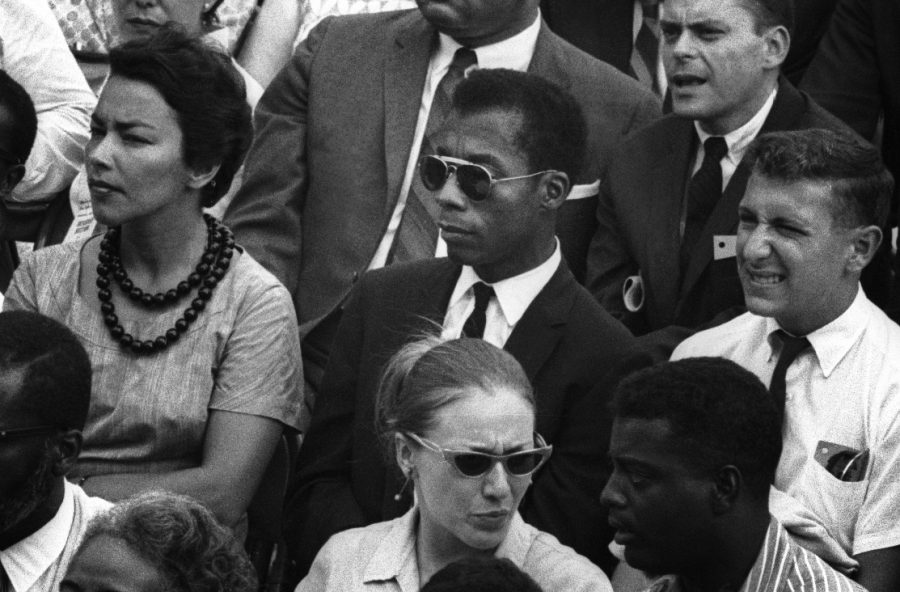“I Am Not Your Negro” 40 Years Old, But Modern
Courtesy of Magnolia Pictures, Photo by Dan Budnik
“I Am Not Your Negro” contains a discussion about racism through the writings of James Baldwin. The document remains relevant to the events happening today.
February 8, 2017
Raoul Peck’s “I Am Not Your Negro” is not so much a documentary about James Baldwin as much as it is one written by him. Using some of his unfinished writings from the 1970s, where the poet, novelist, essayist and critic ruminated on the deaths of civil rights activists Medgar Evers, Malcolm X and Martin Luther King Jr., Peck brilliantly displays the piercingly insightful and depressingly prescient nature of Baldwin’s words.
At any instance during the film, an image of a white protester from the 1960s will appear, his face twisted with anger while holding a sign adorned with swastikas. Next come photos from the unrest in Ferguson. Then, almost surprisingly, images showing horrible brutality against Native Americans play across the screen. While the images are separated by decades — if not centuries — Peck strings these visuals together with Baldwin’s words, cinematically realizing what the man’s writing elaborates: Throughout its history, America has been dominated by race, and white people have nearly dominated all others.
This point is eloquently hammered home with the film’s focus on Baldwin’s discussion of movies, where his childhood cinematic experiences often involved either racist caricatures of black men or depictions of John Wayne as a cowboy hero. Wayne — a white man of course — was based on the story of Britt Johnson, a black man.
Peck’s visuals and Baldwin’s words show how Wayne’s heroic stature in western films mythologized the genocide of Native Americans, characterizing the perpetrators of violence as the good guys and folding racism into pop culture. Baldwin keenly observed that as a viewer, he was supposed to root for Wayne, even though that would mean rooting against himself.
Baldwin’s writing is given life through the remarkable oration of Samuel L. Jackson. His voice is normally an ever-climbing crescendo, but here his tone is fittingly somber — a low gravel that envelops the audience. Jackson’s solemnity is effectively contrasted by videos of Baldwin being interviewed or giving lectures. His cutting syntax is lively, his voice is both proper and dignified and his eyes convey weariness and exhaustion.
In one of these televised moments Baldwin spars with Paul Weiss, a Yale philosophy professor. Weiss condescendingly agrees with Baldwin’s description of racial inequality, with the caveat that he doesn’t understand why all conversations regarding inequalities default to race. This sentiment still exists today, as whenever anyone points out the racist qualities of something — be it a movie or a political policy — a person, almost always white, jumps to its defense while retorting that race isn’t a part of everything. The fact that Baldwin faced such ignorance isn’t surprising, but it is bone-chilling to hear the precise rhetoric from 50 years ago used today.
While narration can lead to monotony in documentaries, Baldwin’s engaging and perceptive character prevents such tedium from happening in the film itself. Nevertheless, Peck seems to be anxious of inciting boredom, and at times he attempts to cinematically spice up the film, which only distracts the audience. At one point, in order to match Baldwin literally, the film cuts to outer space and then to Mars, lingering on grainy images of the planet’s surface for far too long. It’s preposterous, jarring and totally unnecessary.
Fortunately these missteps are few and far between, and they never fully get in the way of Baldwin’s writing. For clarification, at the point when Peck jumps to space, Baldwin is pointing out how much of America finds the racial oppression in Birmingham, Alabama to be totally alien. They think Birmingham is on Mars, when in fact Birmingham is real — Birmingham values plague America.
What makes “I Am Not Your Negro” so remarkable is not just how it encapsulates so much of America’s racial history, but also how it applies this history so fluidly to today’s race relations. Racism across America has always existed and continues to persevere. James Baldwin knew about it 40 years ago, and it’s a reality with which many Americans still are reconciling.
Email Ethan Sapienza at [email protected].




























































































































































